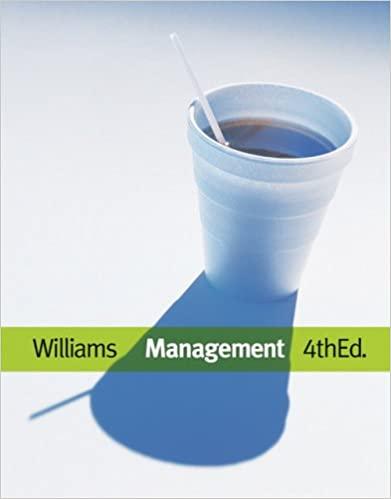Question
A personal SWOT (Strengths, Weaknesses, Opportunities, Threats) analysis will give students an opportunity to reflect and identify their personal characteristics that helps them achieve and
A personal SWOT (Strengths, Weaknesses, Opportunities, Threats) analysis will give students an opportunity to reflect and identify their personal characteristics that helps them achieve and expand their Learning Objectives within the workplace.
Task and Instructions:
Conduct personal SWOT analysis for a senior undergraduate student studying International Relations with a minor in Business. Bare in mind that you should refer yourself as this person in your writings.
- Analyze all four aspects about this person - strengths, weaknesses, opportunities, and threats.
- Be creative. You can also draw/decorate.
Here are some questions you can ask yourself to complete the assignment:
- Strengths
1. What professional qualities does this student have? Try to be as specific as possible. Remember a time when you worked or was engaged in a project at school and what abilities did you exercise then?
2. What does he/she do well? Is it easy for you to study languages, math or science? Can you cook, paint or repair cars? Write down all the things he/she might be good at although they may seem irrelevant to the job he/she might be looking for.
3. What is the level of my education? Think of all the courses you took during your studies. What did you enjoy? What could be useful for your future career? Does your education give you a competitive advantage against others in the same field? 4. What is my biggest achievement? Try to remember a time when you were extremely proud of yourself. What did you do? How did you do it?
5. What personal qualities do I possess? - Do you friends come to you for advice? Are you an outgoing person? Or maybe you are stubborn but in a positive way (let's call it persistent ;). Source: www.lamission.edu
- Weaknesses
1. What do I not do well? - Maybe there is a specific thing you know you can't do. For example, I am terrible at mechanical tasks.
What can I improve? - Think about the things you'd like to do, the qualities you'd like to have. What can be improved and how?
2. What tasks do I usually avoid doing? - The fact that you do not want to do something may mean that you do not enjoy doing it.
3. What are the roots of my failures? - Try to figure out what are the reasons behind any failure you may have experienced in the past. What did you learn from it?
- Opportunities
1. What trends do I see in my professional area? - What are the recent trends? What type of people are getting hired? What skills do they have? Is it a growing field?
2. Can I obtain better education? - Think of courses that can develop your skills and give you a competitive advantage.
3. How can I get noticed? - What can I do to draw attention to myself professionally? Creating LinkedIn profile, for example. Start networking. What does your resume look like? What does you Facebook profile say about you?
4. Is there a steppingstone to get me to my dream job? - Sometimes to get to your dream job sometimes you have to do things you think you are overqualified for. Are there internships in the companies you want to work for? Can you start working half-time just because you like the job you are going to do?
5. Who can support me in achieving my goal? - Who can you learn from? Who can introduce you to the right people? Who can help you improve your CV? Is there a person who can show you how to use your strengths in the best way possible? Who will pick-me up when things don't go well?
6. **Opportunities are uncontrollable (environmental) factors. Your opportunities maybe other people's opportunities too** For example, you are studying in a major that has high potential in today's job market.
- Threats
1. What obstacles do I face? - Remember this is something that you have limited to no influence on. Is there an economic situation that prevents you from getting a job?
2. Who/what may get in my way? - Who are your biggest competitors and what are they doing? Who else is competing for this job?
3. Are there changes in labor politics? - Can you work legally? Are there certain mandatory training or educational requirements that are required?
4. Is technology changing my professional field? - Is technology changing the future of my industry? How do I stay ahead of that trend?
5. Am I marketable? - You may have done everything else right but still you are unemployed. Think about whether the market you are trying to sell yourself on is the correct one. Remember that you are a product (of your environment, of your education, of yourself), and as such you have to examine the niche you are trying to fit yourself in so that you can be able to market yourself in the best way possible.
6. **Threats are uncontrollable (environmental) factors. Your threats maybe other people's threats too**. For example, COVID-19.
Step by Step Solution
There are 3 Steps involved in it
Step: 1

Get Instant Access to Expert-Tailored Solutions
See step-by-step solutions with expert insights and AI powered tools for academic success
Step: 2

Step: 3

Ace Your Homework with AI
Get the answers you need in no time with our AI-driven, step-by-step assistance
Get Started


